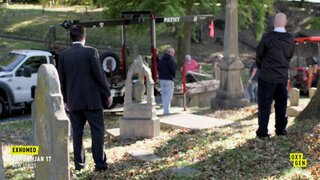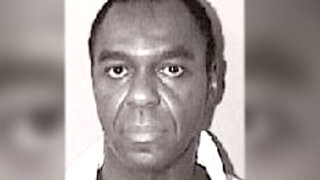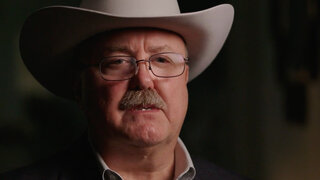Create a free profile to get unlimited access to exclusive videos, breaking news, sweepstakes, and more!
What Does It Mean To Exhume A Body — And Why Does It Happen?
On Oxygen’s series “Exhumed,” executive produced by Kelly Ripa and Mark Consuelos, exhuming a body is the key to solving a crime.

This article was updated to reflect the 2022 season of "Exhumed."
Dead bodies may be harmless — after all, when someone’s dead, they’re not exactly coming after you — but they disturb many of us all the same. No wonder “The Walking Dead” has been one of the most popular television shows for years, almost every horror movie features a scene with a creepy skeleton, and a common superstition is to hold your breath when you go past a graveyard.
But while dead bodies may give living humans the creeps, they can hold the answer to many mysteries, as shown in “Exhumed,” airing on Oxygen on Sunday, May 8 at 7/6c and executive produced by Kelly Ripa and Mark Consuelos. Sometimes, exhuming a body is the only way to solve a case.
So, what does it mean to “exhume” a body, anyway? “Exhume” means to disinter something that was buried, aka dig a body up from its not-so-final resting place. Exhumations typically involve heavy machinery to get deep into the earth, and usually occur during the summer months when the ground is softer, crime scene cleaning company Aftermath explained on its website. The casket is taken out of the ground, and what remains of the body is moved to a lab or another kind of holding vessel, depending on the reason the body is being disinterred. Officials attend to make sure the exhumation follows regulations, while family is typically advised not to come as it can be a deeply upsetting process, the company noted.
The state of the body varies, depending on how long it’s been since death. Embalming a body to preserve it longer is a trend that started in America in the 1920s, so bodies from that time period and later tend to be in a better state, Slate reported in 1998. However, even if embalming has occurred, the body does eventually disintegrate, a process that’s usually faster in warmer, moister places.
“After a year or so, a well embalmed body would be fairly well preserved," Donald G. Wright, Maryland's deputy chief medical examiner at the time, told The Baltimore Sun in 1991. "After 10 years, there would probably be some soft tissue, maybe some recognizable facial tissue. After 25 years I don't think you'd find much that's recognizable. In that time a lot of fungus would grow and consume the soft tissue."
Within 50 years, just a skeleton will be left, and within hundreds of years, the body will be pure dust, according to the outlet.
So, why do we dig up decaying bodies anyway? Well, there are a wide range of reasons to disturb the dead.
As shown in Oxygen’s new series “Exhumed,” authorities will often dig up bodies to help them solve a case. With new advancements in forensic testing, skeletons can hold all sorts of clues to pinpoint a killer that would have been previously missed. These advancements also mean unidentified bodies can finally be given a name as well.
Other times, bodies need to be exhumed so a new autopsy can be performed — which might reveal a more accurate cause of death.
But it’s not just about criminal investigations. Sometimes people need to extract DNA to confirm familial relationships, like Warren G. Harding’s alleged grandson, who wanted to dig up Harding’s body (with a reality television camera crew in tow) so he could be 100% sure they were related, The New York Times reported in December 2020. The request was denied.
Another common reason bones are disinterred is because of the valuable scientific and historic information they can give us. For example, Sharon DeWitte, a bioarchaeologist at the University of South Carolina, studied skeletons excavated from a mass grave of bubonic plague victims in London. In doing so, she was able to see signs of age, childhood illness, trauma, and malnutrition in these victims and concluded those who were older and had a history of poor health (and likely to have lived in poorer conditions) were more likely to die of Black Death, National Geographic reported in 2016.
“We should expect there to be some variation in risks based on biological and also social factors,” she told the outlet while discussing what this conclusion means for the way we look at future epidemics.
Bodies have also been exhumed so they can simply be put into a different resting place. Sometimes, families want to put the body in a new plot; other times, it’s for sadder reasons: Mexico started exhuming bodies in the summer of 2020 to make room for coronavirus victims, CBS News reported.
And sometimes, it’s for political reasons. In 2019, after a vicious legal battle, former Spanish dictator Francisco Franco was disinterred from a basilica to a cemetery where his wife was buried.
Prime Minister Pedro Sánchez said it was done to “bring an end to the moral insult that is the exaltation of a dictator in a public space,” The New York Times reported at the time.
Clearly, there are all kinds of reasons for a body to be exhumed. The soul may be long gone from these remains, but what’s left still tells a story — whether it’s one of familial connection, societal values, or of murder.


















